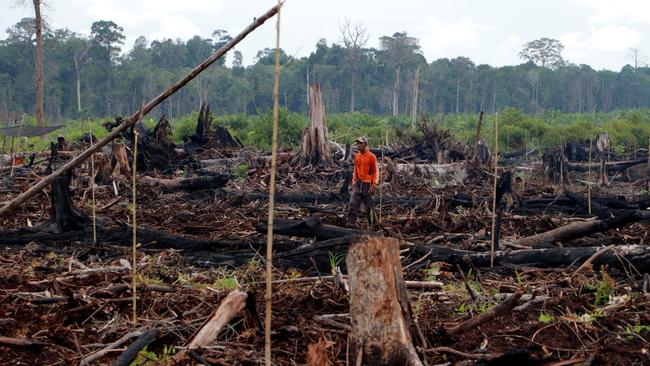Climate advisory firm Pollination inks deal to grow Indonesian carbon credit market
An Australian climate advisory group has struck a deal with Indonesia’s sovereign wealth fund to unlock and commercialise carbon credits in Southeast Asia’s largest economy.
Business
Don't miss out on the headlines from Business. Followed categories will be added to My News.
Australian climate advisory group Pollination has signed a deal with Indonesia’s sovereign wealth fund to unlock and commercialise carbon credits in Southeast Asia’s largest economy.
Indonesia in May said it would allow foreign entities to purchase carbon credits, a potentially lucrative revenue stream for the Asian country as Jakarta is estimated to be home to some 80 per cent of the world’s carbon credits.
Carbon credits are increasingly popular with emitters as they allow the purchaser to abate emissions. A growing number of countries are pushing corporations to abate or reduce emissions.
Indonesia hopes to position itself at the epicentre of this demand, and joined with Brazil and the Democratic Republic of Congo at COP27 to form an alliance of tropical rainforest nations, which has been dubbed the “OPEC of the rainforests”.

Carbon credits are typically created through agricultural or forestry practices, although a credit can be made by nearly any project that reduces, avoids or captures emissions.
For countries such as Indonesia – which is one of the world’s biggest carbon emitters and wants to cut its emissions by more than 30 per cent by 2030 – creating carbon credits could achieve its emission reduction targets and protect its rainforests.
To unlock the market, Pollination and the Indonesia Investment Authority said they will collaborate to deliver quality projects that global investors are actively seeking.
“There are very critically important and high quality nature projects across Indonesia that require financing,” Pollination chief executive Martijn Wilder told The Australian.
“We’ll be looking for opportunities where you can go in and do things like restore natural habitats, do mangroves, do peatlands, do forests and rehabilitation of mine sites by replanting nature. Then the sovereign wealth fund will actually invest in those, so they can get a return from that.”
Mr Wilder said that commercialising these projects will then make them an investable asset class for Australian companies, which are demonstrating an ever larger appetite for such instruments.
Carbon credits are, however, controversial. Critics say their use allows emitters to use cheap abatement rather than reduce emissions, while there is also concern about the quality of the credits and whether the instruments actually deliver the carbon dioxide sequestration that they are supposed to.
Still, demand for credits is soaring, though Australia has moved to curtail and close any avenue for its heaviest emitters to use global abatement contracts.
The federal Labor government earlier this year strengthened the country’s safeguard mechanism, the centrepiece of emission reduction policy. Under the scheme, first implemented by the Coalition government, Australia’s 215 largest emitters will have to reduce their carbon emissions by about 5 per cent every year.
To achieve its legal obligation, the 215 companies – which together produce 28 per cent of Australia’s emissions – will either invest in technology to reduce their carbon dioxide output or purchase credits to abate emissions.
The companies covered by the safeguard mechanism, however, will not be able to purchase offshore carbon credits.
Originally published as Climate advisory firm Pollination inks deal to grow Indonesian carbon credit market



